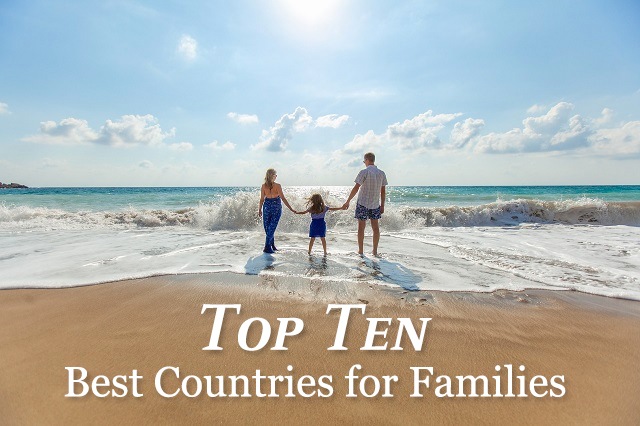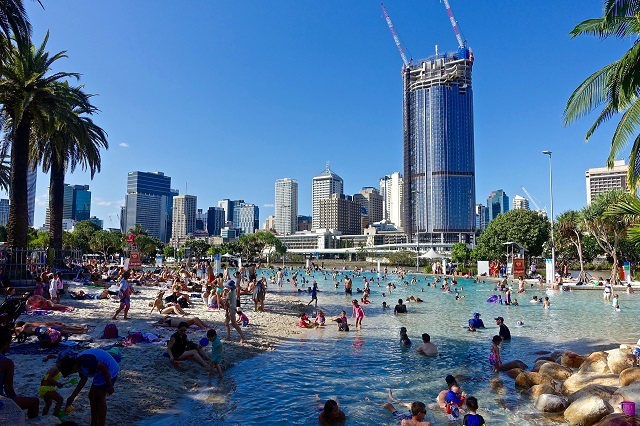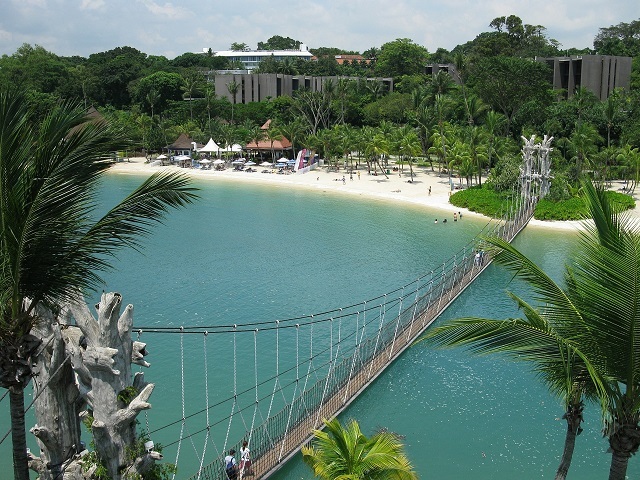Moving overseas can be a difficult decision for single people, and hard for couples, but it presents unique problems when moving an entire family.
Not only do you have to consider employment opportunities and cost of living but also factor in schooling, viable support networks as well as balancing accommodation needs with locale.
Every family will have their own unique requirements of a new home that will largely depend on the age of your children as well as the primary influences with you and your partner; jobs, finances, preferences about climate, culture and proximity to the UK.
Our guide below will steer you through some of the best countries for expat families to move to.
Contents
The Ten Best Places for Raising a Family Overseas

Our guide to the Ten Best Countries to raise a family.
With studies indicating that moving house is one of life’s biggest stresses we wanted to put together a guide to help you make the right choice for your family’s future.
After all, the stress of moving is magnified considerably if you are heading overseas.
Below is our list of the top ten best countries to relocate for families.
Tip: If you have already made the decision to venture overseas, remember to check out our to-do list for leaving the UK!
New Zealand

The Oceanic island nation of New Zealand is carved from fire and ice with volcanoes and glaciers giving the country distinct character with much more in between.
The verdant pastures with rugged mountains give way to bountiful lakes and breath-taking caverns and gorges.
It is little wonder that so many British families choose to live here. So many in fact that Brits make up almost 7% of the country’s population. Dubbed ‘Britain, but better’, there are lots of similarities between the two nations that make emigrating here a natural choice and one that is an easier transition for families.
Pros for Expat Families Living in New Zealand
Language and culture: New Zealand is a western nation that speaks English, thus making transition and integration far easier. Whilst there are, of course, cultural divides particularly with the indigenous people, the country has plenty of familiar brands and sights. There are many shops that stock UK brands including ‘Union Jack’s’, a British food store that can supply your favourite foods. So, if the kids are struggling with missing Mr Kipling’s pies, Shreddies or Hartley’s Seedless Jam then you get a quick fix from home.
Great education system: New Zealand operates a schooling system similar to that of the UK. Children start school at the age of 5 and continue in compulsory education until 16. The quality of schooling is excellent and the country regularly places in the top ten worldwide locations for education.
Size of the expat community: There are almost 300,000 Brits living across New Zealand and, whilst a larger number of these live in the major towns and cities, you will find an English accent wherever you go. The benefits of such a network mean that wherever you settle you can reach out to a community of people who know what it’s like to be new in town. As for the kids, there are plenty of groups running activities to help them acclimatise to their new home.
Safety: New Zealand ranks fourth on the Global Peace Index and is consistently one of the safest places to live. Raising a family only gets safer in Iceland, Denmark or Austria.
Cons for Expat Families Living in New Zealand
Distance: However small the world may seem in this digital age, the truth is that New Zealand is 11,500 miles and a 24 hour flight away from the UK. Families who move to the land of the long white cloud often do so because they do not have an extended family network. Those that have close relatives in the UK can find it hard to only see them once a year.
Cost of dental care: Whilst the cost of living generally is higher than the UK, the cost of dental care is staggering by comparison. Over half of the population of New Zealand do not visit a dentist regularly, even in middle-income families, because of the high cost.
Limited work opportunities: Relative to its size, New Zealand has a small population and work opportunities are restricted. The nation has a culture of being intolerant towards people who ‘shine’ or stand out from a crowd. It’s known as the Tall Poppy Syndrome…those that are head and shoulders above the rest simply get cut-down. The combination of these two factors can restrict career satisfaction and job opportunities.
Australia

Australia is another popular destination for Brit families looking to emigrate and there is little wonder why when you weigh up the positives. The climate, relaxed lifestyle and the familiar Western lifestyle make Australia a perfect choice. Combined with picture-perfect beaches and the adventurous rugged outdoors, the land down under is a great choice for families.
Pros for Expat Families Living in Australia
Standard of living: Australia offers a standard of living that many Brits can only dream of. The climate, the beaches, the relaxed attitude and the wonderful access to some of the best facilities in the world, Australia has it all. The minimum wage in Australia is twice that in the USA and the people are friendly to boot. What more could you ask for?
Great quality healthcare: Australia has a great public healthcare service in Medicare although there are additional costs which aren’t covered (such as ambulance services). You should consider extra health insurance but you can rest assured that the public healthcare system is very good.
1.2 million people can’t be wrong: Yes, that’s the number of Brits living in Australia. Making up over 20% of the expat population of the country, Brits have made Oz a popular place to emigrate though they don’t tend to congregate in communities. The benefit of the large numbers is that you are never far from a face that has gone through what you are going through yet (unlike other in other countries) there is no tendency to marginalise yourself into a network of ‘Brits Abroad’.
Cons for Expat Families Living in Australia
Dangerous creatures: Though the cities are mostly immune to the dangers of the Australian wildlife, the country is home to some of the world’s deadliest animals including snakes, spiders and crocs. Don’t be too alarmed, it just means that a picnic in the bush comes with some extra precautions but if you are moving to the suburbs or somewhere outback then you need to make sure everyone understands how to treat a dangerous animal. The kids should be taught from a young age.
Cost of living and property prices: Not only are the day to day costs of essentials far higher than many people are used to but property is also very expensive. Buying property in Australia is very different to the UK with laws that favour the seller so pulling out of a sale due to new information coming to light or changes in circumstances can leave you out of pocket. Competition for good houses is fierce as the rate of building has slowed down so you may find renting your only option until the right property comes up. The average cost of a house in Sydney is now over £460,000. You should also factor in the high costs of private medical care, which is preferred by many British expat families.
Price of private or international schooling: Whilst the Australian education system is generally very good, the cost of many private or international school fees can be very high. The same goes for university fees for non-residents. You should also be aware that the number of places available is far fewer than the number of families looking to place children in such schools; as a result, competition can be fierce.
Sweden

Far from seeking the Nordic Noir, expats looking for a cultured lifestyle in a safe, secure and spacious country not too far from the UK will not find anywhere quite like Sweden. With plenty of green spaces, outdoor living and winters nowhere near as long and miserable as you’d think, Sweden is an ideal place to raise a family.
Pros for Expat Families Living in Sweden
Quality of life: Scandinavian countries have by far the highest quality of life globally and Sweden is no different. The Swedes enjoy a great work-life balance, good quality healthcare, education and housing. The cost of living is quite high and disposable incomes low yet the nation is still content; Sweden ranks 10th on the World Happiness Report 2016 (UK is 23rd).
World’s Best Place to Raise Kids: According to recent surveys, Sweden rates as the best place to raise children. Using eight indices to measure countries, Sweden scored highly on gender equality, human rights, income equality, healthcare, education, safety, happiness and being family friendly.
Climate: If you are thinking of moving to Sweden then you are probably not seeking a beach lifestyle so it will come as no surprise that the weather can get pretty cold. The climate does vary depending on where you are in the country as does the amount of sunlight you get over winter. However, the summers, though short, are quite pleasant at an average high of 23oC. In fact, Sweden has the best summer temperatures of all the Scandinavian countries. As for snow, the country deals with it very well and you and your family can enjoy plenty of winter activities such as skiing, sledging and snowshoeing.
The people and culture: Scandinavian life is cool, there’s no two ways about it; the people are warm, friendly and easy to get along with and the culture is laid-back. As for shopping opportunities…there’s a reason why Ikea is so globally popular; Swedish design is world-class.
Cons for Expat Families Living in Sweden
High rate of taxation: It can be tricky to work out exactly how much tax you pay in Sweden by comparison to the UK as there are some similarities between rates like VAT, income tax and national insurance but there are also stealth taxes, property taxation and other consumer driven rates. However, it is acknowledged that Sweden has a high but fair rate of tax that seems to benefit the nation as a whole; as a result, the Swedes don’t seem to get upset about it.
High cost of living: Coupled with the high taxation, life in Sweden can be expensive. Ranking 15th on the Global Cost of Living index, groceries, property and consumer goods are all pretty expensive comparable to wages. However, life in capital Stockholm is still cheaper than life in London.
Job opportunities: The population is small and, outside of the ‘big’ cities, jobs can be hard to come by. Unemployment is around 8% and there can be fierce competition for jobs.
Singapore

The Lion City of Singapore is a bustling metropolis of multiculturalism and offers modern living as a gateway to a rich and traditional way of Asian life. There is plenty to commend the country including excellent career and social opportunities as well as world-class education and standards of living. The city can be expensive and many expats don’t look at other locations on the island but suburban and rural life can be rewarding and exciting.
Pros for Expat Families Living in Singapore
Low rate of crime: Singapore is a very safe country to live in and is ranked 2nd on the Global Safety Index. (behind South Korea). From corruption to vandalism, theft and harassment, Singapore benefits from the lowest incident rates in the world.
Great education: The public schooling system in Singapore offers a high standard of education that is perfectly affordable. Private and international schools are more expensive and can be difficult to get into but rarely provide anything better than you can get from the public schools. Extra-curricular activities are wide and varied and learning a second language is compulsory.
Big social scene: Not only is the British expat community very active but locals are also very welcoming and easy to befriend. Living in Singapore will offer families a wide network of new friends and ensure an easy transition into a new way of life.
Healthcare: Singapore has a good range of medical facilities and, as long as you are covered by health insurance, the costs aren’t too onerous. However, you should be aware that some doctors don’t accept insurance payment and you may need to meet the charges before they are settled by your insurers.
Cons for Expat Families Living in Singapore
Property and rent prices: As a small country with a dense population (particularly in and around the capital), land and space is at a premium. The cost of renting in the city is comparable to central London prices. A 3 bedroom apartment will cost around £3,200 in Singapore city whilst the price per sq. m to buy will set you back £6,300 even outside of the city; compare that to the average cost of £1,500 in Birmingham and you are looking at a 320% increase over the UK midlands!
Weather: Though Singapore benefits from year-round temperatures of 26-27oC, the country does get a lot of rain; on average 178 days a year. The reason is due the country experiencing two monsoon seasons; December to March and May to September. The latter can also bring high winds and thunderstorms.
Cost of running a car: Public transport in Singapore is excellent but if you want to own a car to explore then you will find that the cost to run one is very high. Insurance, taxes, duties and tolls all rack up.
Czech Republic

In the heart of Central Europe, the Czech Republic is rich in culture, history and opportunity. Since the fall of communism in the 1980s, the Czech Republic has grown to become a much-travelled country with visitors enjoying the well-preserved Gothic architecture of the towns and cities, medieval castles and the bountiful hospitality of the Czech people. Raising a family in the Czech Republic is far easier than you’d think with good access to schooling, healthcare and transport.
Pros for Expat Families Living in Czech Republic
Great educational institutes: The literacy rate in the country is high at 99% and the Czech education system is of a very good standard. However, the curriculum is taught in Czech. International schools are available and there are British schools in Prague. Fees are affordable and the standards compare well to the state run schooling system.
Affordable healthcare: The state health system is generally free but even doctors’ fees are low cost. There are private clinics and these are relatively inexpensive. Insurance is recommended but if you cannot budget for this then the care provided for residents is still of a good quality.
Low cost of living: On a par with Thailand, the cost of living in the Czech Republic is very low. Consumer goods, rent and essentials are all significantly cheaper than the UK and, with a good salary, you will find that a higher standard of living is more affordable.
Low crime rates: The Czech Republic has a good safety index ranking and crime is relatively low; however, incidences of pickpocketing are on the rise especially in crowded places and in Prague specifically.
Cons for Expat Families Living in Czech Republic
Language: Though English is widely spoken you may still find the language to be a barrier particularly when you want to get things done. Ironically this is nowhere more evident than in Government departments such as immigration. The country has a reputation for bureaucracy which is made worse if the process requires a translator at every turn.
Getting a Czech Driving License: You can drive on an international license for the first three months after your arrival but after that you will need to obtain a Czech license. The test is a combination of written and practical examinations and not all instructors can speak English. The exams are also only available in Czech so if you don’t speak the language you will need to have a court appointed translator with you.
Lack of customer service skills: Customer service in the Czech Republic is very poor and the simplest of tasks can take inordinately long periods of time. However, Czechs don’t complain and it has become a social norm to expect queues, poor service and surly clerks.
Canada

As another Western nation that speaks English, offers high quality education and healthcare, Canada is a natural choice for Brits looking to emigrate with families. Canada also offers some of the words most stunning scenery, vibrant cities and affable people. The country is well-located for travel opportunities to the USA and has a buoyant economy offering great employment opportunities. The cost of living and quality of life is on a par with the UK yet Canada can provide a great alternative to family life.
Pros for Expat Families Living in Canada
Clean, healthy living: The Great White North is one of the cleanest, least polluted and environmentally friendly countries in the world. With access to some amazing outdoor spaces including the huge skies of the open countryside, there is plenty to get you out into nature.
World-beating medical and dental care: Arguably Canada has the best healthcare in the world. The services are first-rate and the Medicare system offers it up for free. Expats should hold their own health insurance to cover dental costs.
High standard of education in state schools: Most expats enrol their children in the state schools as the standards are very high. There are still international schools available if you would prefer your children to continue with a British curriculum.
Cons for Expat Families Living in Canada
The weather: Snowfall in some of Canada’s cities can be extreme and the winters very cold. A move to anywhere outside of the Vancouver area means at least five months of snow tyres, shovelling driveways and putting up with bitterly low temperatures. Make sure you factor in the extra heating costs when budgeting.
Cost of living: There used to be a time when the cost of living in Canada was much more favourable to the UK but currently they are much the same costs between the two countries. However, if you choose a more rural location then what you save in rent or property costs can be negated by the higher premiums on essentials and consumer goods.
High taxes: Canadians pay an average of around 40% personal income tax which is then further subjected to other taxation such as fuel taxes, goods and services tax and the aptly named ‘sin’ taxes on alcohol and tobacco.
Germany

Germany has a strong and stable economy with good job opportunities, particularly for those who can speak the language. It is a country with a large population, plenty of space and has a strong blend of modern living combined with traditional culture. With a slightly lower cost of living than the UK, Germans benefit from a much higher quality of life (ranked 5th in the world behind Denmark, Switzerland, Australia and New Zealand) as well as a lower crime rate.
Pros for Expat Families Living in Germany
Central location: The position of Germany in central Europe makes for excellent opportunities to explore other countries on those summer family holidays. Weekend road trips to neighbouring Denmark, Austria, Czech Republic and Poland are all doable as is Switzerland, France, Belgium, Luxembourg and the Netherlands. Add to this the fact that public transport is very good. Trains run regularly, on time and cover much of the country. Prices are reasonable for the convenience they offer.
Return of Sunday closures: The UK relaxed the long standing tradition of shops being closed on Sunday in 1994. In Germany however, the laws are more restrictive and even in cities like Berlin, shops can only open on a few Sundays each year. Whilst this may feel inconvenient and anti-modern, it does provide one day a week for families to spend together. It encourages the uptake of leisure activities and promotes a sense of the home that the UK could learn a lot from.
Cost of property: On an affordability index comparing income to property prices, homes in Germany are the 3rd most affordable across Europe (the UK comes in 18th). This is partly due to a difference in attitude towards home ownership. It is not viewed with the same prestige amongst Germans, helping to keep the prices lower.
Language: Of course most Germans speak English very well but the language is easy to learn and you will find that your children can pick it up quickly. Speaking German will help you to acclimatise to local living and allow you to access the culture more easily.
Cons for Expat Families Living in Germany
Working hours: In order to make the Sunday trading laws work, most working days run from 9am to 7pm. Whilst the average working week in Germany is shorter than the UK, you will find that many jobs keep to these hours.
Finding a job: Unemployment rates are low in Germany at the moment but job opportunities for Brits who do not speak the language can be hard.
Bahrain

Bahrain, an archipelago nation in the Persian Gulf is situated in the heart of the Middle East and offers a ‘light’ alternative to this distinctly different culture. From its thriving economy, ancient heritage and dynamic culture, Bahrain has a low crime rates, low cost of living and can offer an exceptionally high quality of life. Over 90% of the country is desert and most of the 10,000 British expats who call Bahrain home live in either Manama, Muharraq or Riffa.
Pros for Expat Families Living in Bahrain
Amazing cultural experience: Though there are half a million global expats in Bahrain to the native population of over a million Bahrainis, the culture of this modern Muslim nation is still undeniably Middle Eastern. It can come as a big shock to the system (in a positive way) to live in this part of the world but it is a unique cultural experience for children to witness.
Low levels of taxation: As a nation that has significant wealth tied up in its oil industry, Bahrain has no need to tax its citizens at levels seen in Western countries. Brits can earn good salaries in Bahrain and benefit from most of it in their take-home pay.
Education: There is an excellent state funded school system in Bahrain as well as over forty international schools including St Christopher’s (reportedly one of the world’s best international schools). State education is principally in Arabic which means that an international school will usually be the preferred option. Prices are reasonable and standards high so maintaining good education is not an issue.
Cons for Expat Families Living in Bahrain
Language: Arabic is the official language in Bahrain and, whilst most people speak English, you should learn a little. It not only helps to integrate with local communities and access the real Bahrain but it can also help you get by with basics such as haggling in a souk, picking up groceries and generally showing courtesy to the locals. However, no-one is going to lie to you and try and pretend that it’s an easy language to learn…it isn’t. Still, with plenty of practice you should be able to pick up the basics.
Climate: The weather in this area of the world can take some getting used to. Humidity levels can reach around 80% during the summer months and, with temperatures approaching 40oC, it can be hard to bear. Air-conditioning is the only way most Westerners can tolerate the heat but this in itself can take some getting used to and can aggravate allergies, negatively affect some types of asthma as well as cause dry skin, throat irritation and sensitive eyes.
Limits of property ownership: Expats have limited options when it comes to owning property in Bahrain. Until recently, expats could not purchase any property but these laws have been relaxed and you can now buy freehold property in designated areas.
Spain

There is, perhaps, nowhere you can move to where you will feel more on holiday than if you move to Spain. A long favoured country for Brits to move abroad, the coastal regions offer beach living, resort style entertainment and year-round weather that evokes summer fun. The North of the country differs again and lends itself more to a rural and traditional way of life that is both relaxed and peaceful whereas the cities are as bustling with cosmopolitan chic.
Pros for Expat Families Living in Spain
Cost and quality of living: Spain has a lower cost of living than in the UK with a high quality of life.
Weather: The temperatures in southern Spain over the winter can average around 11oC making ice, snow and hail a thing of the past. There are seasons still and the country gets its fair share of rain…and not only on the plain!
Good quality British schools: If you do want to enrol your children in the state education system then they will need to speak the language; however, there are around 40 British schools around the country that offer very good quality schooling.
Cons for Expat Families Living in Spain
Expats (principally us British): There is a huge community of Brits living in Spain and, whilst this can be a positive thing offering network opportunities and easy transitions, they do tend to congregate in cliques. The problem is that many brits in Spain do not integrate well with locals. The groups can remain isolated and true Spanish living remains elusive. If we can offer some of advice here, experiencing Spain secluded from the Spanish would be a real shame.
Bureaucracy: Red tape in Spain is a par for the course. Getting things done requires paperwork, patience and an understanding of protocol.
South Africa

Moving to the Rainbow Nation of South Africa offers a far-away adventure in culture, climate and diversity. The country has some amazing natural wonders including Kruger National Park, rugged mountains, amazing beaches, canyons, gorges and vast swathes of the Kalahari Desert. The culture is vibrant, the people warm and friendly and the opportunities for family life as diverse as anywhere on the planet.
Pros for Expat Families Living in South Africa
Huge expat network: Brits have been emigrating to South Africa since the 19th century and the country is currently home to over 300,000 British expats. Following in the footsteps of such large numbers can make life a lot easier. Communities are well-established and the British influence can be seen in supermarkets and convenience stores.
Cost of living: Consumer prices, the cost of property and the essentials are significantly cheaper in South Africa than the UK. The quality of produce is very good and your money can buy you good quality accommodation with good security. House styles vary but in a rural location you can pick up a large, spacious and modern five-bedroom home for under £300,000. Generally speaking, you can expect to pay around a third of what you would spend in the UK to maintain the same lifestyle.
Active, healthy lifestyle: With its year-round sun, great weather and such an abundance of outside spaces, South Africa is a great place to enjoy an active lifestyle. Sport runs in the nation’s blood and there are plenty of groups and clubs offering activities from Rugby and Football to mountaineering, scuba-diving and hiking.
Cons for Expat Families Living in South Africa
Dangerous roads: The country has the 42nd highest road mortality rate and is home to some of the world’s most deadly stretches of road. Johannesburg, for instance, is the 13th most likely place to die on the road anywhere in the world.
High crime rates: South Africa has the 5th highest crime rate in the world and, though it isn’t wholly widespread, urban areas can suffer the most. There are areas which are safer than others so researching neighbourhoods and factoring in security costs is advisable.
Distance from UK: Travelling back home to visit relatives (or vice versa) takes eleven and a half hours and flights aren’t cheap.
Our Verdict on Raising a Family Abroad
When the UK is ranking 29th in a global survey of the best places to raise a family, it could be time to look elsewhere.
Focusing on important issues such as health, education and life satisfaction, the most recent HSBC expat report highlighted the growing divide in the children from rich and poor families in terms of health as well as ranking poorly in education in sciences, English and maths.
Even London has recently come under fire as one of the worst ranked major cities to live in.
For many of us, it is the work-life balance that we are looking to restore when we consider emigrating.
Not only can life in another country offer better financial rewards but can also improve our standard of living and deliver that all too important commodity when it comes to raising kids; having more free time.
All of our top ten best places for families offer something unique for British parents seeking a change in lifestyle. The only problem… is choosing which one!
What do you think is the best country for families?
Have you lived in any of the countries above?
Let us know your thoughts, comments, and experiences below.




